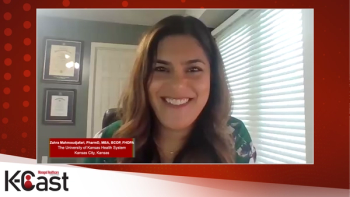
Duvelisib Shows Promise in Treating Relapsed/Refractory CLL/SLL: Insights from the DUO Trial
The recent DUO trial, a global Phase III study, compared the efficacy and safety of duvelisib, an oral PI3K inhibitor, with ofatumumab, an anti-CD20 antibody, in patients with relapsed or refractory chronic lymphocytic leukemia (CLL) or small lymphocytic lymphoma (SLL) who had previously undergone at least one therapy.
Duvelisib is an oral monotherapy treatment that demonstrates clinical efficacy and has a manageable safety profile in patients with relapsed or refractory chronic lymphocytic leukemia/small lymphocytic lymphoma (R/R CLL/SLL).
The recent DUO trial, a global Phase III study, compared the efficacy and safety of duvelisib, an oral PI3K inhibitor, with ofatumumab, an anti-CD20 antibody, in patients with relapsed or refractory chronic lymphocytic leukemia (CLL) or small lymphocytic lymphoma (SLL) who had previously undergone at least one therapy.
In the study, 319 patients were randomized 1:1 to receive duvelisib 25 mg orally twice daily or ofatumumab intravenously (8 weekly infusions, then monthly for 4 months). The researchers explained that patients were required to receive pneumocystis prophylaxis concomitant with study drug treatment. Herpes (HSV/VSV) or cytomegalovirus prophylaxis was recommended.
This group of patients had limited treatment options due to intolerance, comorbidities, progression, or resistance to other therapies.
Corresponding author Jennifer R. Brown, MD, PhD, director of the CLL Center of the Division of Hematologic Malignancies at Dana-Farber Cancer Institute and the Worthington and Margaret Collette Professor of Medicine in the Field of Hematologic Oncology at Harvard Medical School, said Ofatumumab was approved for refractory patients and was the most reasonable comparator at that time.
“For serious suspected immune-mediated or infectious toxicity, duvelisib would be held and a diagnostic workup would be undertaken,” Brown said. “Often infection would be ruled out first, and then if the symptoms persisted, one would consider therapy for a possible immune-mediated toxicity.”
So, if the symptoms were more severe, one could start treating the immune mediated toxicity sooner based on clinical suspicion, while still evaluating for and potentially treating infection.
“The large crossover from ofatumumab to duvelisib means that comparison between the arms at this late timepoint is essentially a comparison between earlier or later duvelisib, rather than a real comparison between the arms,” Brown said. “The majority of patients have also received a variety of other therapies since duvelisib, complicating the comparison even more.”
Moreover, the large crossover rate from ofatumumab to duvelisib impact the overall survival analysis.
“This underscores that the more heavily pretreated patients did better with duvelisib, which suggests that duvelisib may be an option for the most heavily pretreated patients,” Brown said. “We also know that older patients also tend to tolerate PI3K inhibitors better than younger patients, from the standpoint of immune mediated toxicity.”
At present duvelisib would be used after BTKis or venetoclax, and could also be used as a bridge to cellular therapy or transplant. The possibility of combination therapies is also being explored, Brown said.
In the research, the factors contributing to the benefit-to-risk ratio observed for duvelisib in patients with ≥2 prior therapies were compared to other PI3K inhibitors.
“The benefit-to-risk ratio likely improves with more prior therapies because of the lower likelihood of immune-related toxicity in patients who have had more rounds of prior chemotherapy,” Brown said. “This is similar with other PI3K inhibitors where data are sufficient to evaluate it.”
Results from DUO suggest that duvelisib monotherapy may offer an effective treatment for CLL/SLL patients in need of additional therapeutic options.
More research is ahead. For instance, the PRIMO study, a multi-center, parallel cohort, open-label, phase 2 study of duvelisib in patients with relapsed/refractory peripheral T-cell Lymphoma (PTCL) has completed recruitment and final results are pending.
“Recently published interim data from that study suggested strong duvelisib activity in PTCL and greater in some lymphoma subtypes; this provides rationale to further examine AITL and nodal T-cell lymphoma with T-follicular helper phenotype,” Brown said. “Secura Bio is considering clinical trial options in that patient group.”
Newsletter
Get the latest industry news, event updates, and more from Managed healthcare Executive.



















